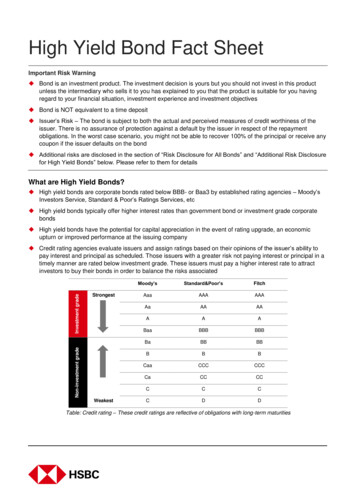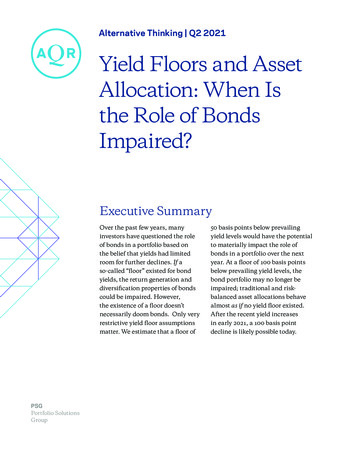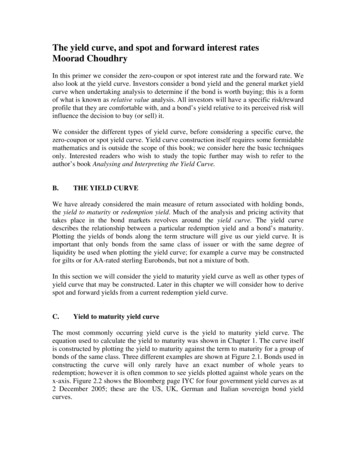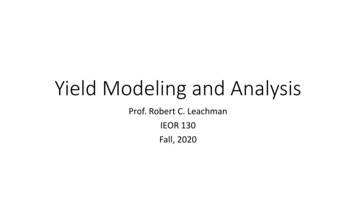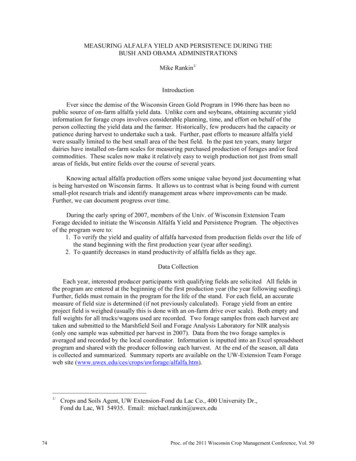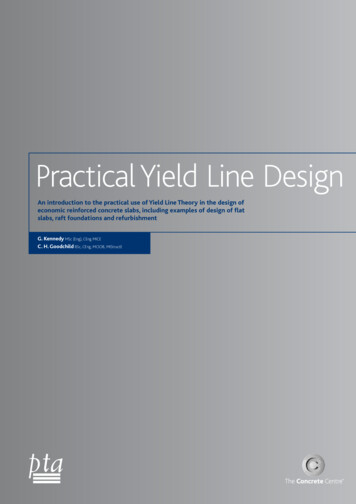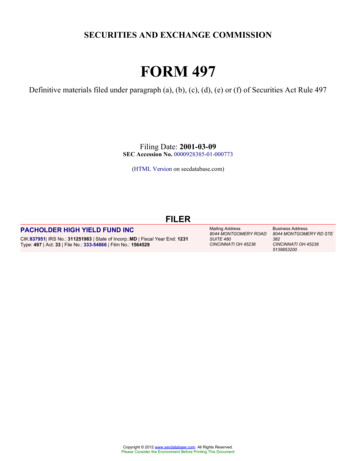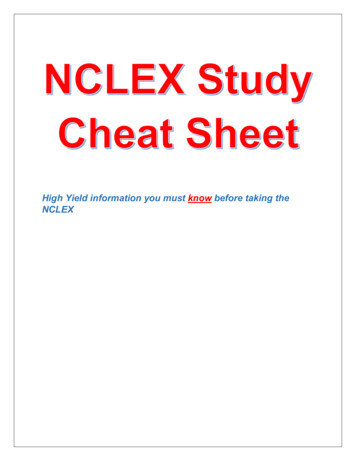
Transcription
High Yield information you must know before taking theNCLEX
PHYSIOLOGICAL INTEGRITY- Reduction for Risk Potential (10-16%)o the signs and symptoms and treatments about cataracts, glaucoma, meniere’s disease,guillain-barre syndrome, meningitis, migraine, Huntington’s disease.o the difference in diabetes 1 and 2. How are they treated? What are signs and symptoms andcomplications?o the signs and symptoms of hypoglycemia and how are they treated.o complications of diabetes 1. Diabetes ketoacidosis and 2. Hyperglycemia hyperosmolar nonketotic syndrome.o what causes cystic fibrosis and its complications.o what PKU is how it’s treated and also its complications.o what does hiatal hernia, pyloric stenosis, gastritis means.o the difference between duodenal ulcer and gastric ulcer.o what Crohn’s disease means, what kind of diet is advised for it?o Be able to differentiate between appendicitis, diverticular disease, and peritonitis.o what hirschsprung’s disease means.o how to care for ostomies. about specific diets for different types of ostomies and what kind ofreturn to expect from different types of ostomies.o everything about cirrhosis, cholecystitis, cholelithiasis, pancreatitis, lupus.o about two different types of jaundice that are seen in newborns.o the age-appropriate health-care procedures for pre-operationo what could be the potential complications after surgery and the nursing consideration for eachone of them.o Try to learn as much about diagnostic tests as possible. Recognize the ones for which patienthas to be on NPO and need special care pre and post test.o about chest tubes- water fluctuation, bubbling, removal, and complications.o about Central venous pressure, and its complications
- Physiological Adaptation (11-17%)o the normal breath sounds and abnormal ones. which pulmonary disease will have which typeof adventitious sound.o what to do in emergencies such as Cardiopulmonary arrest, epiglottitis, MI, dysrhythmias,head injury, chest trauma, abdominal injury, shock, ICP, seizure, and stroke.o how to read an EKG. Calculate HR and rhythm off an EKG.o the difference between defibrillation and cardioversion.o what kind of function ability co-relates with the spinal cord injury.o Signs and symptoms and treatment of fluid volume overload and deficit.o A-Z of ADH and SIADHo A-Z of hypokalemia, hyperkalemia, hyponatremia, hypernatremia, hypocalcemia,hypercalcemia, hypomagnesemia, and hypomagnesemia. You have to study these. There’s noescaping.o the 9-rules of burns and nursing care for burn pt.o Addison’s disease and Cushing syndrome and their complications. Briefly read aboutpheochromocytoma.o COPDs.o pneumonia.o the difference in two different types of Heart failure.o anemia and iron deficiency anemia.o about sickle cell disease and its treatmento about cancer, leukemia and how they are treated- Basic Care and Comfort (6-12%)o how to use crutches, and other assistive deviceso about skin traction and skeletal traction and special nursing considerations while using themo everything about caring for a cast and its complicationo Be able to differentiate between Joint disorders: Osteoarthritis, rheumatoid arthritis, and gout.o about osteoporosis, osteomyelitis, and osteomalacia.o different types of factures and treatment.
o how to care for fractured hip and after total hip replacement surgery.o how to care for patient who got amputation.o difference between Alzheimer’s disease and parkinsons.o Must everything about Thyroid disorder!!!! Focus on signs and symptoms of hypo andhyperthyroidism, treatment, and complications. Very Imp!!!o parathyroid disordero about different types of diets and when they are indicated. For example: for chronic renalfailure low sodium, low protein, and low potassium diet is indicated.o about pyelonephritis, and glomerulonephritis.o about acute and chronic renal failure.o hemodialysis and peritoneal dialysis.- Pharmacology (13-19%)o Study all the drug classes of antibiotics. Be able to recognize antibiotics of different class. sideeffects of specific to each class.o Study all the cardiac meds and their side effects.o all your bronchodilators, steroids used for respiratory disorders. which ones are given foracute and long term maintenance.o different types of insulin. Yes memorize their effective hours.o meds used for depression, bipolar, anxiety, PTSD, etco anticoagulant meds.o different classification of meds used for pain: narcotics, NSAIDS.o which conditions aspirin, NSAIDS are contraindicated.o You still need to rest of the meds, but make sure you at least study the ones that arementioned above.SAFE AND EFFECTIVE CARE ENVIRONMENT- Management of care (16-22%)o about informed consent. Who can sign it and who cannot? For example, pregnant minor cansign consent form for herself and the fetus. There are other few exceptions them.
o about patient right to refuse treatmento nurses role in advance directiveso the rules for restrainso about malpractice, assault, negligenceo what kind of task to delegate to LPNs and CNA. Very important!!o Also what kind of pt. to delegate to float nurses. Very important!!o when to file incident reportInfection Control (8-14%)o the mnemonics for infection control and what kind of precaution you have to take for eachone. Yes you have to memorize all the names of the disease. The most important of all!!!o everything about tuberculosis. about skin test. about treatment process for TB.o the difference between Hepatitis A, Hepatitis B and C.o all about HIV and AIDS, precaution, meds, and treatment for it.o briefly about Lyme diseaseo Be able to differentiate between different STDs. Mainly the signs and symptoms of syphilis,gonorrhea, herpes, and Chlamydia.o what to do for poison ingestion.o briefly about lead toxicityo Read briefly about disaster and bioterrorismHEALTH PROMOTION AND MAINTENANCE (6-12%)- Growth and developmento Memorize erikson’s stage of development. Imp!!o Memorize all age specific developments from infancy to adolescence. For example, by 12months birth weight usually triples. By 15 months, kids are able to walk alone. SomewhatImportant.o age specific toys- Maternity/ Newborn care
o all the normal changes during pregnancy. Have to all of it.o normal weight gain during pregnancy.o what kind of discomfort to expect during pregnancy.o all types of diagnostic test done during pregnancy such as AFP, CVS, ultrasound, NST, CST,Amniocentesis .o Memorize all the changes that occur during different stages of labor.o where to osculate fetus heart based on fetus positiono normal fetal heart rate and respiratory rateo the difference between false and true laboro about different anesthetics given during laboro about Rh compatibility and what needso what nurses should do immediately after birtho APGAR score.o about lactation, breast feedingo ectopic pregnancy, hydratidiform moleo Study pregnancy induced hypertension and diabetes very wello the difference between abruptio placenta and placenta Previao about postpartum hemorrhage, infectiono the normal physical characteristics of newborn and also vitalso about caring for newborns.o what kind of medications are given to newborns such as eye prophylaxis and Vitamin Ko about the care for umbilical cord circumcised peniso about respiratory distress in newbornso Be able to differentiate between physiologic and pathologic jaundiceo about care of infants with cleft lip and palateo rules for breast examination, pap test, mammogram, testicular self exam**** There are many other information to under maternity and newborn which will require someattention- General health maintenanceo Also all the different methods of birth control
o when the anterior and posterior fontanels closeo Memorize immunization scheduleo which foods to avoid for latex allergyo when to avoid tyramine containing foodo basics of physical assessmentso Memorize cranial nerveso Learn all the heard sounds (s1,s2,s3,s4) and their anatomical locationPSYCHOSOCIAL INTEGRITY (6-12%)- Mental healtho about therapeutic responseso different treatment methods for mental illnesso all about anxiety, PTSD, depression, suicide, stress, bipolar disorder, schizophrenia,personality disorder. Pay special attention to nursing response specific to the illness.o two different types of eating disorder and the treatment for ito the difference between the symptoms of different types of withdrawal symptomso what kinds of meds are used to treat for substance usedo Pay special attention to different classes of meds used to treat mental illness, also includetheir side effects, how long it takes of the meds to be effective, any contraindications.Reference: allnurses.com
NCLEX . PHYSIOLOGICAL INTEGRITY - Reduction for Risk Potential (10-16%) o the signs and symptoms and treatments about cataracts, glaucoma, meniere's disease, guillain-barre syndrome, meningitis, migraine, Huntington's disease. o the difference in diabetes 1 and 2. How are they treated?

